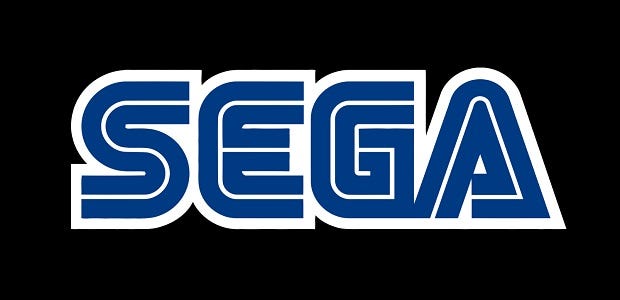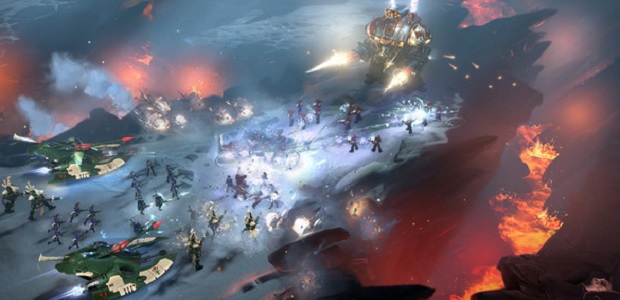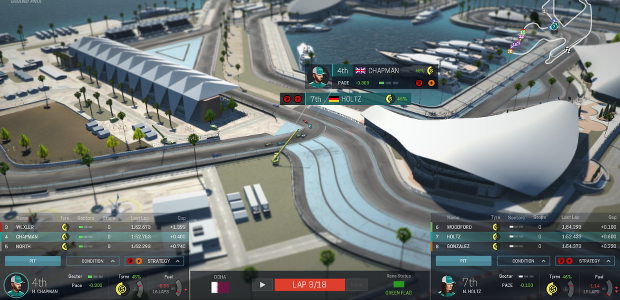Sega On Amplitude, Strategy And Becoming A PC Giant
From Sonic to Strategy
Even though Sega have been publishing PC strategy and simulation games for years now, I still can't see the company logo or hear the word without thinking back to hours spent at schoolfriends' houses, trying to work out if Sonic was too fast or I was too slow. The acquisition of Amplitude was the point that I decided that I needed to ask Sega a very simple question: "Do you want to marry PC strategy games?"
At Gamescom, I sat down with Jurgen Post, COO of Sega of Europe.
RPS: Sega have become one of the biggest PC strategy publishers in recent years. I'm old enough to remember Sega as a console company and now not only are you a big player on PC, but you release some of the most PC games in the world: Football Manager, Total War.
At what point did that shift happen and when did PC and PC strategy in particular become an important target?
Post: Well, you're right. Years ago, Sega was famous for Master System MegaDrive, Saturn and what have you...then, the beginning of 2003, we changed. We became a multiplatform publisher, doing a lot of projects. We were very opportunistic, signing a lot of deals, a massive line-up.
At some point, quality became an issue. For some time, you could sell a lot of products to the Wii platform, but you saw that the quality was becoming more and more important to keep an eye on. And we said, "we have to change".
We wanted to do less, focusing completely on quality. And we were looking internally and figuring out which are the good studios that are always performing, and that was Creative Assembly with Total War, and Sports Interactive with Football Manager, so we decided to focus on those two first of all. In 2013, we were able to buy Relic and, as you say, recently we bought Amplitude.
It's all PC, it's all strategy, and it's a hardcore niche market but we like it. If you're very good within your niche, you can be quite successful, but we haven't been shouting about it because I believe, first of all, you need to prove that you can remain successful, and launch [very good] games every year. Quality needs to be number one. We're reaching a moment now when we are a really good PC publisher, and it's time to start shouting about it, and to be proud of it.
I think we are a global leader now when it comes to strategy, and I think one of the testaments to the quality and how the outside world looks at us is the fact that Creative Assembly is making Halo Wars 2, which shows that Microsoft is also watching and thinking, "ok, we have one of the biggest IPs in the world, and who can we talk to?" The fact that they came to us and that we're building that game, a strategy take on a huge IP, shows that we're going in the right direction.
RPS: Could you talk a little about the relationship with some of those studios. Creative Assembly and Sports Interactive are two of the biggest studios in the UK...
Post: CA is absolutely the biggest, we have more than 450 people now, and still growing fast.
RPS: And you began with Sports Interactive? That didn't necessarily seem like a natural fit at the time, in terms of your history and expertise. Did they approach you?
Post: With SI, we went from Championship Manager to Football Manager, so that was one of the first challenges. That wasn't a genre-specific challenge; it was a challenge of community development, branding, communication. Fortunately we were very successful with that, and Miles Jacobson has done a great job with his team to bring all of those people over to our world.
The fact that PC was good business was obvious but the packaged goods side of PC was slowing down, and eventually Steam and the digital platform was a blessing for us.
RPS: Amplitude have said that one of the attractions of Sega was seeing the way you'd handled the relationship with Creative Assembly and Relic.
Post: Yes. That's the reason why Amplitude chose us. We could say that we made a choice to get a relationship with Amplitude off the ground but actually it's them making the choice, because they had other opportunities. There were other companies. The reason they chose to come to Sega is exactly as you say - they see how we work with CA and Relic, and Sports Interactive.
We have what we call the pillar strategy. We believe that everything starts with the studios, and we call those studios the pillars. They're responsible for the roadmap, we make them responsible for the brand strategy and PR strategy, and then Sega of Europe (SOE) puts it into practice. We're there to serve the pillars.
It's almost a reverse relationship, where we say the studio is everything and we help them to make their products bigger, rather than the publisher taking precedence. That's what we're trying to do with Total War, Football Manager, Dawn of War and Company of Heroes. Amplitude didn't dream about being independent, they dreamed about making the best 4x game possible. They've done that with Endless Legend and now we're launching Endless Space 2 as the next step, and we can help them to make that the best game possible by supporting them. Endless Legend has already been very successful but if they want to make it the next Total War, they need help and they need support. I think we can provide that.
RPS: A lot of independent developers I talk to are still wary of publishers. They feel that there will be interference, that their way of developing and releasing games will have to change. What do you see as the benefits you can offer?
Post: A good example is Christian West at Playsport, who created Motorsport Manager on mobile. They've done 1.6 million downloads and they sold it for around three dollars. We saw that and we started talking to them, and we said if you can take this to PC, we would love to work with you. In this case we haven't done an acquisition. It's a very talented young team, making a beautiful game [It is. I've seen it - more on that later in the week - Adam] and we think we can help them to make it very successful.
We're trying to take our experience with the larger studios to young developers, almost startups, and to focus on quality with them as well. If we see passion from a developer, we can take all the business side away from them. They do the creative, we do the IT, HR, legal, sales, marketing, PR...everything. That's what we're good at.
RPS: What is the process of identifying a studio like that. Do you scout for teams?
Post: Oh yes! We're constantly talking, travelling the world, getting in touch with studios that we like. Sometimes a deal happens through that network. Amplitude is a good example of that. Studios know a lot of other studios. They talk to one another about their experiences. Sometimes a studio will approach us, sometimes we go to them. We're constantly scouting though.
That doesn't mean we always want to buy studios. We also want to work in partnership with them, but we are always looking to build.
RPS: You've also ended up with two huge Games Workshop licensed games. There are a lot of Warhammer games out there now, but Dawn of War and Total War are certainly among the biggest. When did you first speak to Games Workshop?
Post: It's funny actually because we'd been talking to them for a long time about a Total War Warhammer game, and while those conversations were ongoing, we acquired Relic in January 2013. So we were already talking to Games Workshop with regards to Total Warhammer, and then the opportunity with Relic came along, so suddenly we had 40k and Fantasy worlds.
It's really good fun! First of all, the Total War community had been asking for a fantasy product and to bring Warhammer as that Fantasy branch was a marriage made in heaven. The game is the best-performing Total War title to date. And Dawn of War is our big push for next year, which is exciting as well.
RPS: Looking at the studios as 'pillars', do you look for ways to find new audiences for each of them? That must be a factor in Total Warhammer's success, and with Football Manager, you have the Touch versions now.
Post: Yes. We have Football Manager Mobile as well.
RPS: Even something like Alien Isolation, which isn't at all the kind of game we'd expect from Creative Assembly. Do you look within those studios and try to find new creative and business outlets for them?
Post: Yes, absolutely. Alien Isolation is a fantastic game, and three years ago we did an Alien VR experience in Oculus. I think it was three years ago. That would be another dream as well, right? Alien in VR. We're still looking into that.
Just yesterday I had a discussion about making an arcade experience around Isolation. We haven't done the deal, but you could see a virtual reality experience on arcade. With VR, you have to see it to experience it. Playstation VR is slightly more affordable than HTC Vive or Oculus, but it's still a big investment. So I can see an arcade machine, where you have an Alien Isolation VR experience on arcade, rather than having it necessarily be something you need to buy for your home.
But we also have products on mobile and Steam. Total War Arena was launched on Steam and we've removed it for now, to make sure we can get it right before relaunching, because once you have a game on Steam, you can be working every day just to keep it up and running. So we took it down to make improvements and within a couple of months, we'll have big announcements about that.
RPS: Do you have any thoughts on why you've found such a strong presence in strategy particularly? Was it intentional or was it a case of working with strong studios that happened to be in that field?
Post: Well, first of all, when we bought Creative Assembly, we knew that it was already a very successful studio. The same with Sports Interactive and Amplitude. The fact that it's strategy helps because through ten years, we do have experience with that market, and it's a segment we love to be in. But that's not to say we'll always be a strategy publisher - Alien Isolation was a new direction, and we'll have announcements over the next couple of months that will show that we're not just a PC strategy focused company.
RPS: Does it help to have studios with similar outlooks and working within the same genre? Presumably the talk to one another.
Post: Yes. We want our studios to be very independent, and that's why they keep their names. But of course they talk. Of course. And so they should! When the Halo Wars team flies over to Seattle they will definitely head over to Vancouver to have discussions with Relic, to look at each others' products. With Miles Jacobson being Mr Football Manager, of course he will talk to Christian about Motorsport Manager.
We try to let people use their experience in order to help one another, but we never force it. Creative Assembly won't be told they have to look after Amplitude and Miles won't be told he has to look after Motorsport Manager. It needs to happen naturally.
RPS: When did Amplitude come onto your radar?
Post: We started talking to them last year. But we talk to studios that we like all the time, and this time an opportunity came up. We believed that our ambitions matched their ambitions. They told us that they wanted to grow; not a little, but a lot, and we said we could help them with that. At the beginning of January, those discussions became very serious - it always takes a long time to get all the details and terms in place.
RPS: There's a trend of big publishers having a smaller indie branch - things like the Square Enix Collective, EA Originals - is that something you're interested in?
Post: Yes. We have an initiative internally called Sega Searchlight. It's another one of our pillars. The name tells you what it is - it's a way of searching for the best products, and a good example is Playsport. Motorsport Manager is, we believe, a fantastic game, which can definitely work on PC. We can make it bigger than it is at the moment and it can grow into a pillar over time.
We'll have more announcements from the Searchlight team. It could be supporting smaller studios and startups, it could be PC ports. We're looking at all of the content from the Sega catalogue and asking, "can we bring it back?" and how would we do that? Not just simple ports, but focusing on quality.
RPS: You have a lot of IPs, of course, some of which we haven't seen for a long time.
Post: We have different initiatives around the older Sega IPs. The Megadrive Collection is one of those, for the people who want to play retro games. But then we have games like Shenmue, which was pretty much at the top of every list of titles that people wanted to see revived. We have more though and we're constantly looking at them.
We have some great IPs coming out next year and we'll have announcements toward the end of this year about some of those. New versions of old games.
RPS: Thanks for your time.





